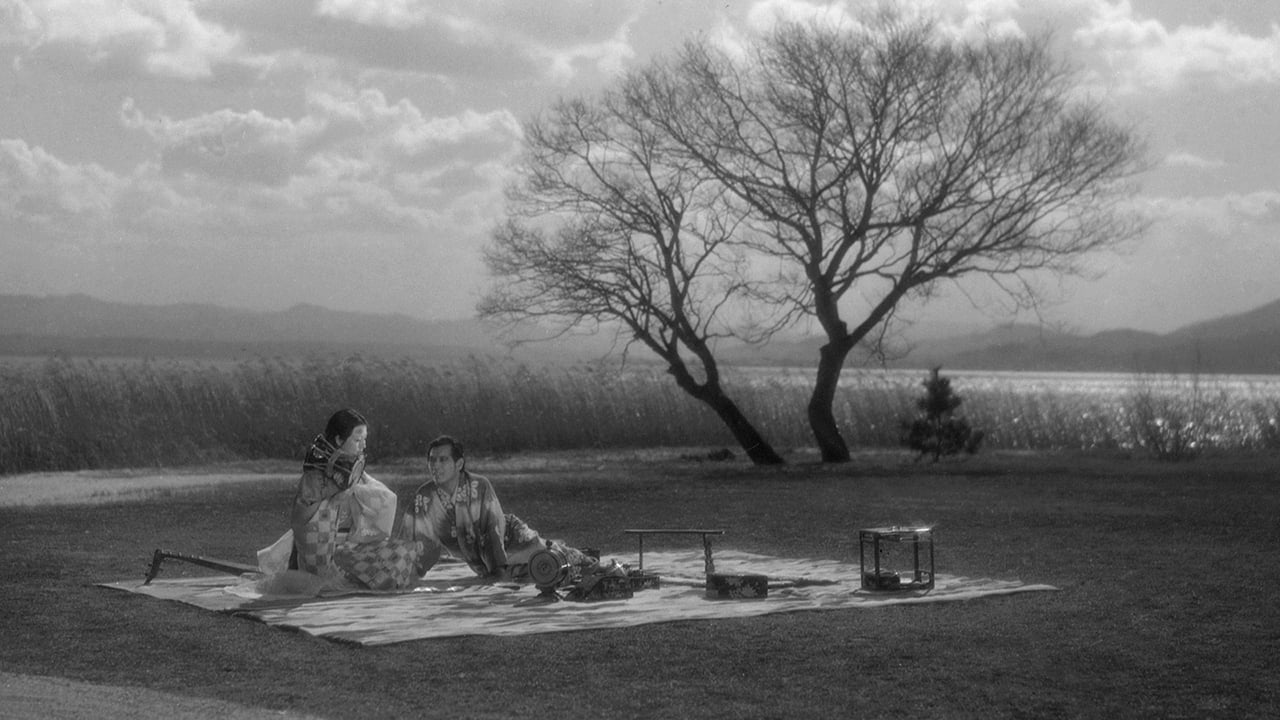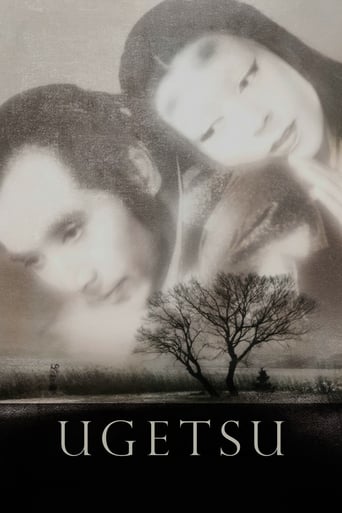

Overrated
... View MoreI was totally surprised at how great this film.You could feel your paranoia rise as the film went on and as you gradually learned the details of the real situation.
... View MoreUnshakable, witty and deeply felt, the film will be paying emotional dividends for a long, long time.
... View MoreMostly, the movie is committed to the value of a good time.
... View MoreThis is a buddhist film, just not a secular buddhist film. I think the message Kenji Mizoguchi wanted to convey was that living in the present and appreciating what you have is the only way to reach nirvana. the scene where Tôbei, Genjurô and their wives are making their way to Nagahama in a river so foggy that they can only see directly in front of them is an allusion to their ignorance of the suffering they will endure. unfortunately, despite the two wives being central to the story, they only serve as accessories to the two brother's Tôbei and Genjurô's development as characters. the movie's message is a very moral one, yet one I personally don't agree with (sometimes what you have is really paltry) which makes the movie's subpar cinematography and indistinct music rather blatant. It's not the worst Japanese drama of it's time, but it doesn't hold a torch to innovators like Kurosawa and Kobayashi's work. Ugetsu in my opinion is overrated and hardly watchable a second time.
... View More...unless you are a film-maker.You know, i will be 60 this year and I have seen thousands movies, literally. I love Kurosawa, Ozu, Kubrick, Bergmann, Herzog, Fellini, Wenders, Altman, Jarmush, Kaurismaki, Bunuel and dozens of other art movie makers. Even Lynch. A friend of mine is a movie collector: he owns thousands of VHS, DVD, Super 8 and he insisted to borrow me a copy of Ugetsu. I wanted to stop it after 10 minutes but I didn't and I made a mistake: it was a pain. I didn't get almost anything of the (allegedly wonderful) tales that were goin on. I repeat myself: I love movies. Ozu's Sanma No Aji (1962) was delightful. I strongly recommend it even if Fast and Furious fans would find more similar to a slide show than to a movie. But it is 113 minutes of amazing cinema. In Ugetsu I could not relate to any of the characters and things going on. And I started hating it. I felt frauded and frustrated.And that's why I gave it 1/10 Just like I did with other movies I hated for different reasons, like The Green Mile, The Usual Sospects, Tron - Legacy and La Vita È Bella.I did not even give 1/10 to Sharknado because it made me laugh, so it deserved a 3/10.So please stay away from this movie.Hope it cvan be useful
... View MoreSixteenth Century Japan. Civil wars. Military marauders and rapists. Rival clans fighting each other. The samurais, individual warriors following a rigid behaviour code and imposing themselves as an outstanding social groupThis movie develops itself in these surroundings in a half-poetic, half-realist atmosphere but very well succeeded in filmic and plot terms.Fancy and fantasy also shows up in some moments. A parallel story of two countrymen is told. One is a craftsman who Works on clay potteries, The other is a fool that wants forcefully to become a samurai though it doesn't have enough money to get the necessary outfit. Both leave their houses in a village later plundered by one of the armies above referred and go away where to make their dreams come true leaving their wives behind. This turns out to be very tragic and after several adventures including the love relationship of the potter with a ghost princess, they cone back home and meet several unhappy vicissitudes some of them having been caused by those violent soldiers. Enchanting film direction, seducing and sentimentally well presented.
... View MoreKenji Mizoguchi's Epic period piece "Ugetsu" is a war movie, ghost story and love story all rolled into one, but really it is derived from several stories from Ueda Akinari's book of the same name. I just watched "Ugetsu" for the first time today and am amazed by it. Mizoguchi does a brilliant job of creating a scene where the lines of reality and fantasy are blurred. It is like watching a fairy tale come to life and accepting it as reality, like being in a dream where everything seems real no matter how absurd it may seem; we don't question it's validity, we just take it as it is. When we think we are in fantasy, we are suddenly thrown back into reality and vice versa. This is highly attributed to the masterful cinematography and use of music. "Ugetsu" is not like any other film I have seen. We are brought to a poverty-stricken Japan at war and follow several individuals who's world is different than ours. They try to survive when their village is raided, trying to avoid enemy pirates and bandits alike. They deal with love, loss and temptation. The realism of the mother (played by Kinuyo Tanaka) and her child being attacked and robbed by bandits is in direct contrast with the next scene of a man (Masayuki Mori) caught between his world and the fantasy world of the living and the dead as he asks for forgiveness from the spirits he dishonored. This is all done in a way that blends these different realities together. The ending is heartwrenching.It is a Samurai movie but there is hardly any sword fighting. Of what there is, though, is very effective. The difference between "Ugetsu" and a Kurowsawa film is evident. Kurowsawa was likely influenced by this, but it is in a category of its own. I am interested in checking out more from Mizoguchi. "Ugetsu" is not only one of the greatest of Japanese Cinema, but ALL of Cinema.
... View More